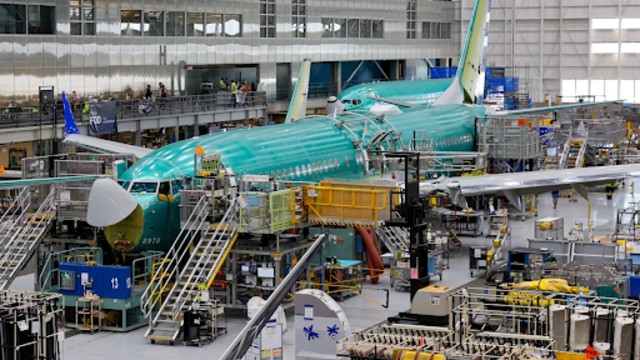
Boeing 737 MAX aircraft are assembled at the company’s plant in Renton, Washington. Jennifer Buchanan/Pool/Reuters
A Boeing 737 MAX originally bound for China’s Xiamen Airlines made an unexpected return to the US on Sunday. The jet had been stationed at Boeing’s Zhoushan facility, awaiting final delivery. It landed back at Seattle’s Boeing Field at 6:11 p.m., still carrying Xiamen Airlines’ branding.
A Detour Across the Pacific
The aircraft’s journey included refueling stops in Guam and Hawaii before reaching Seattle. The reasons for its return remain unclear. However, it mirrors rising tensions between the US and China, particularly on trade.
Tariffs Fuel Delivery Uncertainty
Earlier this month, US President Donald Trump imposed steep new tariffs on Chinese imports, reaching a baseline of 145%. In response, Beijing retaliated with its own 125% tariffs on American goods. Analysts say these levies could make importing US aircraft economically unviable for Chinese airlines.
Aviation consultancy IBA estimated the Boeing 737 MAX’s market value at around $55 million—making tariff costs significant.
China Warns Against One-Sided Deals
China’s Ministry of Commerce issued a stern message, urging other nations not to make trade concessions to the US at Beijing’s expense. “Appeasement cannot bring peace, and compromise cannot earn one respect,” a spokesperson said.
As reported by the BBC, China called on the global community to stand for fairness and to defend international trade rules. The ministry insisted on multilateral cooperation and rejected coercive tactics.
Allegations of Pressure from Washington
A Bloomberg report added fuel to the debate, stating that Washington was pressuring countries seeking tariff relief to reduce trade with China. Citing unnamed US officials, the report claimed that non-compliance could lead to financial penalties.
China expressed its willingness to resolve trade issues through equal consultation. Still, it warned that any nation striking a deal at Beijing’s expense would face reciprocal countermeasures.
Countries Caught in the Crossfire
Nations like Japan and Indonesia are reportedly in talks with the US to avoid hefty import tariffs. Japan may increase its import of American rice and soybeans, while Indonesia could boost purchases of US food and commodities.
These shifts might come at the cost of other suppliers, further complicating the global trade landscape.
No Winners in a Trade War
US trade representative Jamieson Greer recently stated that around 50 countries have approached Washington seeking tariff exemptions.
China has condemned the US for what it calls a misuse of tariffs under the pretense of fairness. “The United States has abused tariffs on all trading partners,” China’s commerce ministry said, accusing Washington of pushing countries into one-sided negotiations.
A Call for Unity Against Economic Pressure
During a recent visit to Southeast Asia, Chinese President Xi Jinping urged nations to unite against unilateral economic pressure. In an article published in Vietnamese media, he noted, “There are no winners in trade wars and tariff wars.”
Jesper Koll of Japanese trading firm Monex Group summarized the dilemma for many: “Certainly, Japan doesn’t want to choose between America and the People’s Republic of China.”
This latest aircraft return may be symbolic, but it reflects the high-altitude stakes in an intensifying trade conflict.















